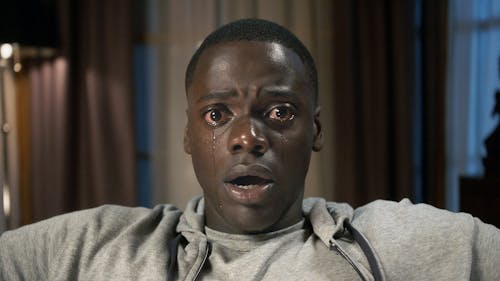WRIGHT: Jordan Peele's 'Get Out' is not it
Column: The Black Light

Jordan Peele’s 2017 directorial debut "Get Out" was a critical success, from box offices and audiences alike. But as soon as the film rolled out to theaters this conversation of its cultural impact and the Black experience somehow got welded together without anyone's approval, specifically not from the Black women and men who this story is somehow reflective of.
Immediately after the release of this film, Feb. 24, 2017, it seems like every white “woke” person asked their nearest Black friend their opinion of this film like it was a right of passage unto the luxurious “wokeness” or to fuel their “white ally complex.”
Although I personally enjoyed the film as it was one of the more recent horror movies with a leading Black man, Daniel Kaluuya, Peele, a Black director, and filled with Black women and men, it personally was not as great or as “nuanced” as the white world has touted to Peele.
Peele’s directorial ability was definitely something that should be praised, but due to how his film is made.
The film is a horror film with a horrible experience that Black women and men fear without a doubt, but as the film has aged white people began stretching the way the film “impacted” America.
In correction, it has not been overblown by just white civilians, it has been blown out of proportion by non-Black women and men who strive for wokeness.
Over this past semester, I have seen or heard something along the lines of, “We should watch 'Get Out'” in class meetings from non-Black students and professors a total of three times.
The first two were in a course named Black Profiles in Comedy in regards to us watching it for the “racial conversation” and the latter is for a course on media and pop culture, which actually had an assignment to watch this film and react to it in regards to the racial component brought into play by Peele. These two courses abhorrently disrespect the films place in the horror genre by reducing it to a film about race.
I am not saying that race does not play a part in the way the film was constructed, but too often the form of the film over the past four years has been reduced to just a film about race with horror in the background.
In the year of 2021 this Godforsaken film is still being seen as such a seminal icon in the Black experience, when in reality it is hyperbole and absolutely contrary to how the film should be viewed.
Peele’s 2019 film "Us" with a mostly Black cast, led by Lupita Nyong’o and Winston Duke did not get much or really any of the same critic hysteria on racial issues as much as "Get Out," when the racial tensions or conversation is not as evident but could be made for the film as well.
In my hypothesis, the mass hysteria of "Get Out" comes from the aforementioned stratification of wokeness by non-Black women and men as sort of a guilty conscience that has been festered up by seeing the depiction of a Black man in an interracial relationship (in a fictional setting) being tortured by a white family with “out of the ordinary” Black housekeepers.
It is like this film resonated with non-Black people more than anything and to make amends by it, they are shoving it down the throats of their nearest Blacks.
Professors and educators, stop blaring this movie as some holy grail racial story, as it is nothing to praise. It shows the experience of a fictional relationship and story that does not provide nuance to any student’s life and (going out on a limb here) more or less reinforces the portrayal of Black trauma-porn to your students and more specifically Black students.
Go find another movie, because "Get Out" is not it.
Amir Wright is a School of Arts and Sciences senior majoring in journalism and media studies and minoring in Africana studies. His column, "The Black Light," runs on alternate Fridays.
*Columns, cartoons and letters do not necessarily reflect the views of the Targum Publishing Company or its staff.
YOUR VOICE | The Daily Targum welcomes submissions from all readers. Due to space limitations in our print newspaper, letters to the editor must not exceed 900 words. Guest columns and commentaries must be between 700 and 900 words. All authors must include their name, phone number, class year and college affiliation or department to be considered for publication. Please submit via email to oped@dailytargum.com by 4 p.m. to be considered for the following day’s publication. Columns, cartoons and letters do not necessarily reflect the views of the Targum Publishing Company or its staff.



